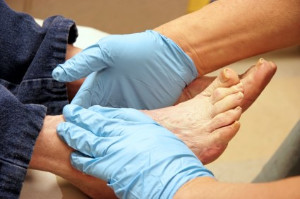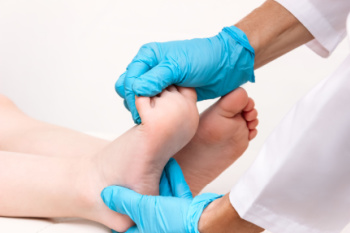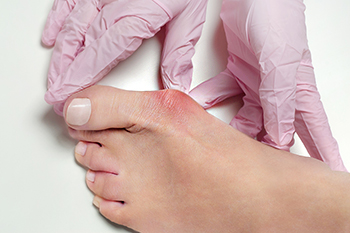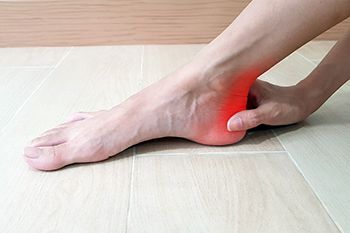Call Us Today! (203) 975-9600
SAME DAY APPOINTMENTS AVAILABLE
June 2025
Why Diabetic Foot Care Matters

Diabetic foot care is important because high blood sugar levels can damage nerves and reduce blood flow to the feet. This leads to a loss of sensation, called neuropathy, which makes it hard to feel pain, temperature, or injuries. Poor circulation also slows healing, which increases the risk of infections and serious complications. Common symptoms include numbness, tingling, burning, dry or cracked skin, and slow-healing wounds. Feet may appear discolored, swollen, or develop ulcers without noticeable pain. These changes can lead to serious issues if not treated early. A podiatrist can assess circulation, nerve function, and inspect for wounds or deformities. Regular check-ups, proper nail trimming, custom footwear, and wound care are key parts of treatment. Prevention includes daily foot checks, washing and moisturizing the feet, and wearing well-fitting shoes. If you have diabetes, it is suggested that you make an appointment with a podiatrist for ongoing evaluation and treatment.
Diabetic foot care is important in preventing foot ailments such as ulcers. If you are suffering from diabetes or have any other concerns about your feet, contact one of our podiatrists from Preferred Footcare, LLC. Our doctors can provide the care you need to keep you pain-free and on your feet.
Diabetic Foot Care
Diabetes affects millions of people every year. The condition can damage blood vessels in many parts of the body, especially the feet. Because of this, taking care of your feet is essential if you have diabetes, and having a podiatrist help monitor your foot health is highly recommended.
The Importance of Caring for Your Feet
- Routinely inspect your feet for bruises or sores.
- Wear socks that fit your feet comfortably.
- Wear comfortable shoes that provide adequate support.
Patients with diabetes should have their doctor monitor their blood levels, as blood sugar levels play such a huge role in diabetic care. Monitoring these levels on a regular basis is highly advised.
It is always best to inform your healthcare professional of any concerns you may have regarding your feet, especially for diabetic patients. Early treatment and routine foot examinations are keys to maintaining proper health, especially because severe complications can arise if proper treatment is not applied.
If you have any questions please feel free to contact our office located in Stamford, CT . We offer the newest diagnostic and treatment technologies for all your foot and ankle needs.
Nerve Problems in Children Are Often Linked to Other Health Conditions

Some children develop nerve issues in the feet and legs as a result of other medical conditions affecting their entire body. These nerve problems, known as peripheral nerve disorders, can cause tingling, numbness, weakness, or burning sensations. In children, they may be connected to illnesses such as diabetes, autoimmune disorders, or infections. When these underlying health conditions affect how nerves send signals, it can lead to trouble with walking, balance, or coordination. Early signs are sometimes subtle, like frequent tripping or unexplained foot discomfort. Identifying the root cause is important, as treating the overall condition often improves nerve symptoms. If a child begins to show signs of nerve changes or foot pain without injury, it is suggested that you visit a podiatrist for further investigation.
Peripheral artery disease can pose a serious risk to your health. It can increase the risk of stroke and heart attack. If you have symptoms of peripheral artery disease, consult with one of our podiatrists from Preferred Footcare, LLC. Our doctors will assess your condition and provide you with quality foot and ankle treatment.
Peripheral artery disease (PAD) is when arteries are constricted due to plaque (fatty deposits) build-up. This results in less blood flow to the legs and other extremities. The main cause of PAD is atherosclerosis, in which plaque builds up in the arteries.
Symptoms
Symptoms of PAD include:
- Claudication (leg pain from walking)
- Numbness in legs
- Decrease in growth of leg hair and toenails
- Paleness of the skin
- Erectile dysfunction
- Sores and wounds on legs and feet that won’t heal
- Coldness in one leg
It is important to note that a majority of individuals never show any symptoms of PAD.
Diagnosis
While PAD occurs in the legs and arteries, Podiatrists can diagnose PAD. Podiatrists utilize a test called an ankle-brachial index (ABI). An ABI test compares blood pressure in your arm to you ankle to see if any abnormality occurs. Ultrasound and imaging devices may also be used.
Treatment
Fortunately, lifestyle changes such as maintaining a healthy diet, exercising, managing cholesterol and blood sugar levels, and quitting smoking, can all treat PAD. Medications that prevent clots from occurring can be prescribed. Finally, in some cases, surgery may be recommended.
If you have any questions, please feel free to contact our office located in Stamford, CT . We offer the newest diagnostic and treatment technologies for all your foot care needs.
Are Bunions Affecting Your Everyday Life?
Treatment and Complications of Bunions

A bunion is a bony growth that develops at the base of the big toe when the joint becomes misaligned. Bunions are often the result of inherited foot structure problems, such as flat feet or joint looseness. Over time, the top of the toe leans inward, causing pain, swelling, and difficulty walking. Bunions can lead to complications, if ignored. Bursitis, which is inflammation of the joint's fluid-filled sac, may develop and cause additional pain and stiffness. Other complications include hammertoes, overlapping toes, metatarsal pain, and thickened skin or calluses. In certain cases, joint damage can limit motion in the big toe or result in permanent deformity. A podiatrist can assess the severity of the bunion and determine the most appropriate care. Treatment options include custom orthotics to relieve pressure or bunion surgery to realign the bones and remove inflamed tissue. If you have painful bunions, it is suggested that you schedule an appointment with a podiatrist for an exam and appropriate treatment options.
If you are suffering from bunion pain, contact one of our podiatrists of Preferred Footcare, LLC. Our doctors can provide the care you need to keep you pain-free and on your feet.
What Is a Bunion?
Bunions are painful bony bumps that usually develop on the inside of the foot at the joint of the big toe. As the deformity increases over time, it may become painful to walk and wear shoes. Women are more likely to exacerbate existing bunions since they often wear tight, narrow shoes that shift their toes together. Bunion pain can be relieved by wearing wider shoes with enough room for the toes.
Causes
- Genetics – some people inherit feet that are more prone to bunion development
- Inflammatory Conditions - rheumatoid arthritis and polio may cause bunion development
Symptoms
- Redness and inflammation
- Pain and tenderness
- Callus or corns on the bump
- Restricted motion in the big toe
In order to diagnose your bunion, your podiatrist may ask about your medical history, symptoms, and general health. Your doctor might also order an x-ray to take a closer look at your feet. Nonsurgical treatment options include orthotics, padding, icing, changes in footwear, and medication. If nonsurgical treatments don’t alleviate your bunion pain, surgery may be necessary.
If you have any questions, please feel free to contact our office located in Stamford, CT . We offer the newest diagnostic and treatment technologies for all your foot care needs.
Facts About Achilles Tendonitis

Achilles tendonitis is inflammation of the tendon that connects the calf muscles to the heel. It can occur at the insertion point on the heel, known as insertional tendonitis, or along the middle portion of the tendon, called mid portion tendonitis. Both types may cause pain, stiffness, and difficulty walking. Gentle foot exercises such as calf stretches, heel raises, and eccentric loading, forcing a muscle to produce force while lengthening, can help reduce strain and improve flexibility. A podiatrist can evaluate the severity and type of tendonitis, recommend appropriate exercises, and provide custom orthotics or footwear advice. Early care prevents long term damage. If you are experiencing Achilles pain, it is suggested that you consult a podiatrist for expert guidance and a personalized treatment plan to support your recovery and mobility.
Achilles tendon injuries need immediate attention to avoid future complications. If you have any concerns, contact one of our podiatrists of Preferred Footcare, LLC. Our doctors can provide the care you need to keep you pain-free and on your feet.
What Is the Achilles Tendon?
The Achilles tendon is a tendon that connects the lower leg muscles and calf to the heel of the foot. It is the strongest tendon in the human body and is essential for making movement possible. Because this tendon is such an integral part of the body, any injuries to it can create immense difficulties and should immediately be presented to a doctor.
What Are the Symptoms of an Achilles Tendon Injury?
There are various types of injuries that can affect the Achilles tendon. The two most common injuries are Achilles tendinitis and ruptures of the tendon.
Achilles Tendinitis Symptoms
- Inflammation
- Dull to severe pain
- Increased blood flow to the tendon
- Thickening of the tendon
Rupture Symptoms
- Extreme pain and swelling in the foot
- Total immobility
Treatment and Prevention
Achilles tendon injuries are diagnosed by a thorough physical evaluation, which can include an MRI. Treatment involves rest, physical therapy, and in some cases, surgery. However, various preventative measures can be taken to avoid these injuries, such as:
- Thorough stretching of the tendon before and after exercise
- Strengthening exercises like calf raises, squats, leg curls, leg extensions, leg raises, lunges, and leg presses
If you have any questions please feel free to contact our office located in Stamford, CT . We offer the newest diagnostic tools and technology to treat your foot and ankle needs.









